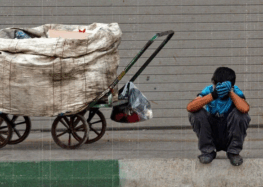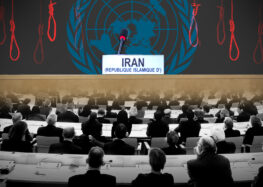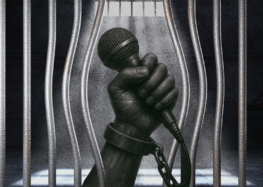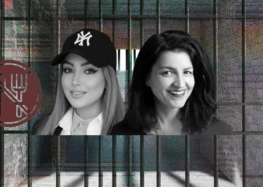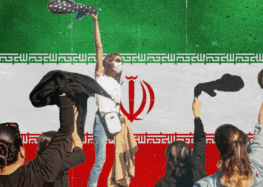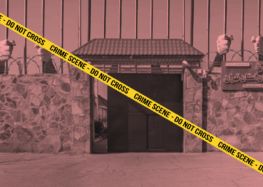Imprisoned in the Hospital: Issa Saharkhiz Remains in Limbo
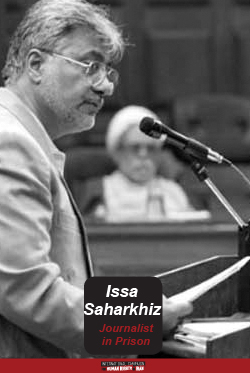
Issa Saharkhiz, journalist and political activist, was arrested in the aftermath of the 2009 presidential election. Security forces assaulted Saharkhiz during his arrest, breaking his ribs. After the 2009 arrest, Judge Abolghassem Salavati, “the Judge of Death” of Branch 15 of the Tehran Revolutionary Court, sentenced Issa Saharkhiz to three years in prison on the charges of insulting the Supreme Leader and propaganda against the regime. In August 2011, he was sentenced to two additional years of imprisonment for his prior press activities. With the deterioration of his physical condition, Saharkhiz was transferred from Rajaee Shahr Prison to Tehran’s Imam Khomeini Hospital in February 2012, where he has remained since.
“My father suffers from cardiac problems and severe blood pressure fluctuations, and his kidneys are 70% disabled. During this time, none of his illnesses have improved and the doctors are only trying to make sure he doesn’t get any worse. The Medical Examiner confirmed my father’s illnesses and recommended medical furlough or [a ruling of] ‘inability to endure punishment.’ A year ago, my father’s specialized physicians wrote a letter, stating that he must be monitored by doctors at all times, but that it’s not necessary for him to spend the nights in the hospital. My family can plan my father’s physical therapy and examination appointments, and bring him to the hospital every day. But despite reviewing the letters from the hospital physicians and the Medical Examiner, the Prosecutor’s Office has not yet agreed with the recommendations and he has been imprisoned inside the hospital like this for 1.5 years,” Mehdi Saharkhiz said about his father’s conditions.
Issa Saharkhiz, journalist and political activist, was arrested in the aftermath of the 2009 presidential election. Security forces assaulted Saharkhiz during his arrest, breaking his ribs. After the 2009 arrest, Judge Abolghassem Salavati, “the Judge of Death” of Branch 15 of the Tehran Revolutionary Court, sentenced Issa Saharkhiz to three years in prison on the charges of insulting the Supreme Leader and propaganda against the regime. In August 2011, he was sentenced to two additional years of imprisonment for his prior press activities. With the deterioration of his physical condition, Saharkhiz was transferred from Rajaee Shahr Prison to Tehran’s Imam Khomeini Hospital in February 2012, where he has remained since.
“The Prosecutor says that these things are none of their business and that they are related to higher authorities, but by ‘higher authorities,’ they don’t mean the Head of the Judiciary. They mean a three-person team comprised of Mr. Taeb from the Supreme Leader’s Office, Mojtaba Khamenei, and [Prosecutor General] Mohseni Ejei, who make all the decisions, even down to whether or not a prisoner can go on furlough or not. Therefore, in effect, not only does the Prosecutor have no role in this, even the Head of the Judiciary has none, either, and they both only maintain appearances,” Saharkhiz told the Campaign about the Prosecutor’s response to inquiries.
Mehdi Saharkhiz told the Campaign that his family requested medical furlough for Issa Saharkhiz so that he could go home and his very high hospital bills could be reduced. He added that his family is also responsible for the expenses of his father’s prison guards. “In addition to the high medical expenses of my father, the family also has to pay for the food and the companion beds the of the prison guards accompanying him. His health insurance does not pay the cost of beds and food for his companions and under such difficult economic times, my family has to accept these costs. We are not the only ones in this situation; other prisoners sent to hospitals are in the same position. Currently, Mohsen Aminzadeh and Abolfazl Ghadyani are at the same hospital as my father and under similar conditions,” he added.
Mehdi Saharkhiz told the Campaign that his father takes 23 different medications every day. “My father had no illnesses before prison, but the first time he was hospitalized after his imprisonment, the physicians prescribed 23 different medications for him, including pills, capsules, and injections, whereas he did not use any medications before,” said Mehdi Saharkhiz. “A part of these illnesses were caused by the situation of interrogations and solitary cells. Why should someone like my father be so severely beaten at arrest time to suffer broken ribs, a damaged rib cage, and a damaged tendon in his left hand?” Mehdi Saharkhiz said.

